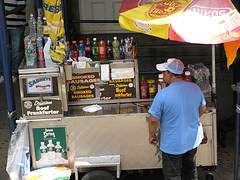Court Blocks Atlanta Mayor's Attempt To Replace Street Vendors With Corporate Monopoly

Atlanta's city council, like many others across the country, has responded to the city's abundance of popular and successful small businesses by intervening and making work more difficult for the owners. In this case, the businesses were street vendors and the city revoked their permits in an effort to instate a corporate monopoly. However, this week the Fulton County Superior Court definitively struck down the council's decision.
The saga started in 2009, when then-Mayor Shirley Franklin signed an exclusive 20-year contract handing all public street-vending rights over to General Growth Properties, a multi-billion-dollar company based in Chicago. The contract required all existing and new street vendors to rent out one of the company's uniform green kiosks if they wanted to continue selling their wares.
Aside from the inflexibility of location, the kiosks are far more expensive than what most vendors pay for their tables or tents, costing up to $20,000 per year. Larry Miller, president of the Atlanta Vendors Association, who has been selling Braves gear for 25 years said, "For me to have a kiosk instead of my regular setup would destroy my business." The benefits of the arrangement? According to Mayor Reed, the kiosks are there to prevent Atlanta from "being turned into a swap meet." Basically, they're easier for local government to control and some people think they look nicer.
Several vendors sued the city for granting a monopoly on public land to a private firm and infringing on their ability to make a living. In December 2012, Judge LaGrua of the Fulton County Superior Court ruled in their favor, striking down the mayor's contract with GGP – and the law behind it – as invalid.
However, according to the Institute for Justice, the public interest law firm representing the vendors:
Rather than accept the court's ruling, Mayor Reed illegally shut down all street vending citywide, throwing dozens of vendors out of work right before the Braves' opening day and the NCAA Final Four.
…
On July 2, 2013, the Fulton County Superior Court [made] clear that its December 2012 order had reinstated the pre-existing vending law that vendors had worked under for years. The ruling came just one day after vendors and civil-rights activists engaged in a widely publicized protest on the steps of city hall. But Mayor Reed disregarded that decision as well.
Apparently frustrated with Mayor Reed's repeated defiance, Judge LaGrua ruled again this week that Atlanta must return the permits to vendors. The city has announced plans to appeal this decision.
Watch the Institute for Justice's video about the case below:


Show Comments (59)